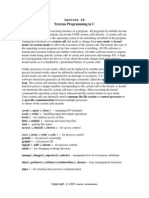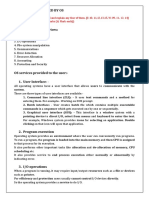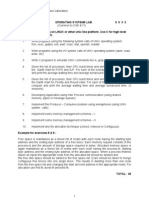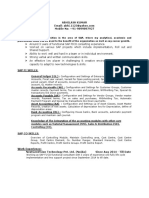Files Notes
Uploaded by
Aliaa Tarek AliFiles Notes
Uploaded by
Aliaa Tarek AliCOMP1521 23T1 — Files
https://www.cse.unsw.edu.au/~cs1521/223T12T3/
https://www.cse.unsw.edu.au/~cs1521/223T12T3/ COMP1521 23T1 — Files 1 / 66
Operating system - What Does it Do.
Operating system sits between the user and the hardware.
Operating system effectively provides a virtual machine to each user.
This virtual machine is much simpler than a real machine
much easier for user to write code
difficult (bug-prone) code implemented by operating system
The virtual machine interface can stay the same across different hardware.
much easier for user to write portable code which works on different hardware
Operating systems can coordinate/share access to resources between users.
Operating systems can provide privileges/security.
https://www.cse.unsw.edu.au/~cs1521/223T12T3/ COMP1521 23T1 — Files 2 / 66
Operating System - What Does it Need from Hardware.
needs hardware to provide a privileged mode
code running in privileged mode can access all hardware and memory
code running in privileged mode has unlimited access to memory
needs hardware to provide a non-privileged mode which:
code running in non-privileged mode can not access hardware directly
code running in non-privileged mode has limited access to memory
provides mechanism to make requests to operating system
operating system (kernel) code runs in privileged mode
operating system runs user code in non-privileged mode
with memory access restrictions so user code can only memory allocated to it
user code can make requests to operating system called system calls
a system call transfers execution to operating system code in privileged mode
at completion of request operating system (usually) returns execution back to user code in non-privileged mode
https://www.cse.unsw.edu.au/~cs1521/223T12T3/ COMP1521 23T1 — Files 3 / 66
System Call - What is It
system call allow programs to request hardware operations
system call transfers execution to OS code in privileged mode
includes arguments specifying details of request being made
OS checks operation is valid & permitted
OS carries out operation
transfers execution back to user code in non-privileged mode
different operating system have different system calls
e.g Linux system calls very different Windows system calls
Linux provides 400+ system calls
examples of operations that might be provided by system call:
read or write bytes to a file
request more memory
create a process (run a program)
terminate a process
send information via a network
https://www.cse.unsw.edu.au/~cs1521/223T12T3/ COMP1521 23T1 — Files 4 / 66
System Calls in mipsy
mipsy provides a virtual machine which can execute MIPS programs
mipsy also provides a tiny operating system
small number of mipsy system calls for I/O and memory allocation
access is via the syscall instruction
MIPS programs running on real hardware also use syscall
on Linux syscall, passes execution to operating system code
Linux operating system code carries out request specified in $v0 and $a0
mipsy system calls are designed for students writing tiny MIPS programs without library functions
e.g system call 1 - print an integer, system call 5 read an integer
system calls on real operating systems are more general
e.g. system call might be read n bytes, write n bytes
users don’t normally access system calls directly
users call library functions e.g. printf & fgets which make system calls (often via other functions)
https://www.cse.unsw.edu.au/~cs1521/223T12T3/ COMP1521 23T1 — Files 5 / 66
Experimenting with Linux System Calls
like mipsy every Linux system call has a number, e.g write bytes to a file is system call 2
Linux provides 400+ system calls
$ cat /usr/include/x86_64-linux-gnu/asm/unistd_64.h
...
#define __NR_read 0
#define __NR_write 1
#define __NR_open 2
#define __NR_close 3
#define __NR_stat 4
...
#define __NR_pidfd_getfd 438
#define __NR_faccessat2 439
#define __NR_process_madvise 440
https://www.cse.unsw.edu.au/~cs1521/223T12T3/ COMP1521 23T1 — Files 6 / 66
System Calls to Manipulate files
Some important Unix system calls:
0 — read — read some bytes from a file descriptor
1 — write— write some bytes to a file descriptor
2 — open — open a file system object, returning a file descriptor
3 — close — stop using a file descriptor
4 — stat — get file system metadata for a pathname
8 — lseek — move file descriptor to a specified offset within a file
above system calls manipulate files as a stream of bytes accessed via a file descriptor
file descriptors are small integers
really index to a per-process array maintained by operating system
On Unix-like systems: a file is sequence (array) of zero or more bytes.
no meaning for bytes associated with file
file metadata doesn’t record that it is e.g. ASCII, MP4, JPG, …
Unix-like files are just bytes
https://www.cse.unsw.edu.au/~cs1521/223T12T3/ COMP1521 23T1 — Files 7 / 66
Using system calls to copy a file #1 - opening files
the C function syscall allows to make a Linux system call without writing assembler
syscall itself uis written partly/entirely in assembler
e.g.: https://code.woboq.org/userspace/glibc/sysdeps/unix/sysv/linux/x86_64/syscall.S.html
syscall is not normally used by programmers in regular C code
most system calls have their own C wrapper functiont, these wrapper function are safer & more convenient
e.g. the write system call has a wrapper C function called write
we only use syscall to experiment & learn
// cp <file1> <file2> with syscalls and no error handling
int main(int argc, char *argv[]) {
// system call number 2 is open, takes 3 arguments:
// 1) address of zero-terminated string containing file pathname
// 2) bitmap indicating whether to write, read, ... file
// O_WRONLY | O_CREAT == 0x41 == write to file, creating if necessary
// 3) permissions if file will be newly created
// 0644 == readable to everyone, writeable by owner
long read_file_descriptor = syscall(2, argv[1], O_RDONLY, 0);
long write_file_descriptor = syscall(2, argv[2], O_WRONLY | O_CREAT, 0644);
source code for cp_syscalls.c
https://www.cse.unsw.edu.au/~cs1521/223T12T3/ COMP1521 23T1 — Files 8 / 66
Using system calls to copy a file #2 - copying the bytes
while (1) {
// system call number 0 is read - takes 3 arguments:
// 1) file descriptor
// 2) memory address to put bytes read
// 3) maximum number of bytes read
// returns number of bytes actually read
char bytes[4096];
long bytes_read = syscall(0, read_file_descriptor, bytes, 4096);
if (bytes_read <= 0) {
break;
}
// system call number 1 is write - takes 3 arguments:
// 1) file descriptor
// 2) memory address to take bytes from
// 3) number of bytes to written
// returns number of bytes actually written
syscall(1, write_file_descriptor, bytes, bytes_read);
}
source code for cp_syscalls.c
https://www.cse.unsw.edu.au/~cs1521/223T12T3/ COMP1521 23T1 — Files 9 / 66
C Library Wrappers for System Calls
On Unix-like systems there are C library functions corresponding to each system call,
e.g. open, read, write, close
the syscall function is not used in normal coding
These functions are not portable
C used on many non-Unix operating systems with different system calls
POSIX standardizes a few of these functions
some non-Unix systems provide implementations of these functions
but better to use functions from standard C library, available everywhere
e.g fopen, fgets, fputc from stdio.h
on Unix-like systems these will call open, read, write
on other platforms, will call other low-level functions
but sometimes we need to use lower level non-portable functions
e.g. a database implementation need more control over I/O operations
https://www.cse.unsw.edu.au/~cs1521/223T12T3/ COMP1521 23T1 — Files 10 / 66
Extra Types for File System Operations
Unix-like (POSIX) systems add some extra file-system-related C types in these include files:
#include <sys/types.h>
#include <sys/stat.h>
off_t — offsets within files
typically int64_t - signed to allow backward references
size_t — number of bytes in some object
typically uint64_t - unsigned since objects can’t have negative size
ssize_t — sizes of read/written bytes
typically uint64_t - similar to size_t, but signed to allow for error values
struct stat — file system object metadata
stores information about file, not its contents
requires other types: ino_t, dev_t, time_t, uid_t, …
https://www.cse.unsw.edu.au/~cs1521/223T12T3/ COMP1521 23T1 — Files 11 / 66
C library wrapper for open system call
int open(char *pathname, int flags)
open file at pathname, according to flags
flags is a bit-mask defined in <fcntl.h>
O_RDONLY — open for reading
O_WRONLY — open for writing
O_APPEND — append on each write
O_RDWR — open object for reading and writing
O_CREAT — create file if doesn’t exist
O_TRUNC — truncate to size 0
flags can be combined e.g. (O_WRONLY|O_CREAT)
if successful, return file descriptor (small non-negative int)
if unsuccessful, return -1 and set errno to value indicating reason
https://www.cse.unsw.edu.au/~cs1521/223T12T3/ COMP1521 23T1 — Files 12 / 66
errno - why did that system call fail?
C library has an interesting way of returning error information
functions typically return -1 to indicate error
and set errno to integer value indicating reason for error
these integer values are #define-d in errno.h
see man errno for more infomation
convenient function perror() looks at errno and prints message with reason
or strerror() converts errno integer value to string describing reason for error
errno looks like int global variable
C library designed before multi-threaded systems in common use
errno can not really be a global variable on multi-threaded platform
each thread needs a separate errno
clever workaround: errno #defined to function which returns address of variable for this thread
https://www.cse.unsw.edu.au/~cs1521/223T12T3/ COMP1521 23T1 — Files 13 / 66
C library wrapper for read system call
ssize_t read(int fd, void *buf, size_t count)
read (up to) count bytes from fd into buf
buf should point to array of at least count bytes
read does (can) not check buf points to enough space
if successful, number of bytes actually read is returned
0 returned, if no more bytes to read
-1 returned if error and errno set to reason
associated with a file descriptor is a current position in file
next call to read() will return next bytes from file
repeated calls to reads will yield entire contents of file
can also modify this current position with lseek()
https://www.cse.unsw.edu.au/~cs1521/223T12T3/ COMP1521 23T1 — Files 14 / 66
C library wrapper for write system call
ssize_t write(int fd, const void *buf, size_t count)
attempt to write count bytes from buf into
stream identified by file descriptor fd
if successful, number of bytes actually written is returned
if unsuccessful, returns -1 and set errno
does (can) not check buf points to count bytes of data
associated with a file descriptor is a current position in file
next call to write will follow bytes already written
file often created by repeated calls to write
can also modify this current position with lseek
https://www.cse.unsw.edu.au/~cs1521/223T12T3/ COMP1521 23T1 — Files 15 / 66
Hello write!
// hello world implemented with libc
#include <unistd.h>
int main(void) {
char bytes[13] = "Hello, Zac!\n";
// write takes 3 arguments:
// 1) file descriptor, 1 == stdout
// 2) memory address of first byte to write
// 3) number of bytes to write
write(1, bytes, 12); // prints Hello, Zac! on stdout
return 0;
}
source code for hello_libc.c
https://www.cse.unsw.edu.au/~cs1521/223T12T3/ COMP1521 23T1 — Files 16 / 66
Using libc system call wrappers to copy a file
// cp <file1> <file2> implemented with libc and no error handling
int main(int argc, char *argv[]) {
// open takes 3 arguments:
// 1) address of zero-terminated string containing pathname of file to open
// 2) bitmap indicating whether to write, read, ... file
// 3) permissions if file will be newly created
// 0644 == readable to everyone, writeable by owner
int read_file_descriptor = open(argv[1], O_RDONLY);
int write_file_descriptor = open(argv[2], O_WRONLY | O_CREAT, 0644);
source code for cp_libc.c
https://www.cse.unsw.edu.au/~cs1521/223T12T3/ COMP1521 23T1 — Files 17 / 66
Using libc system call wrappers to copy a file
while (1) {
// read takes 3 arguments:
// 1) file descriptor
// 2) memory address to put bytes read
// 3) maximum number of bytes read
// returns number of bytes actually read
char bytes[4096];
ssize_t bytes_read = read(read_file_descriptor, bytes, 4096);
if (bytes_read <= 0) {
break;
}
// write takes 3 arguments:
// 1) file descriptor
// 2) memory address to take bytes from
// 3) number of bytes to written
// returns number of bytes actually written
write(write_file_descriptor, bytes, bytes_read);
}
// good practice to close file descriptions as soon as finished using them
// not necessary needed here as program about to exit
close(read_file_descriptor);
close(write_file_descriptor);
source code for cp_libc.c
https://www.cse.unsw.edu.au/~cs1521/223T12T3/ COMP1521 23T1 — Files 18 / 66
C library wrapper for close system call
int close(int fd)
release open file descriptor fd
if successful, return 0
if unsuccessful, return -1 and set errno
could be unsuccessful if fd is not an open file descriptor
e.g. if fd has already been closed
number of file descriptors may be limited (maybe to 1024)
limited number of file open at any time, so use close()
An aside: removing a file e.g. via rm
removes the file’s entry from a directory
but the file (inode and data) persist until
all references to the file (inode) from other directories are removed
all processes accessing the file close() their file descriptor
after this, the operating system reclaims the space used by the files
https://www.cse.unsw.edu.au/~cs1521/223T12T3/ COMP1521 23T1 — Files 19 / 66
C library wrapper for lseek system call
off_t lseek(int fd, off_t offset, int whence)
change the current position in stream indicated by fd
offset is in units of bytes, and can be negative
whence can be one of …
SEEK_SET — set file position to offset from start of file
SEEK_CUR — set file position to offset from current position
SEEK_END — set file position to offset from end of file
seeking beyond end of file leaves a gap which reads as 0’s
seeking back beyond start of file sets position to start of file
for example:
lseek(fd, 42, SEEK_SET); // move to after 42nd byte in file
lseek(fd, 58, SEEK_CUR); // 58 bytes forward from current position
lseek(fd, -7, SEEK_CUR); // 7 bytes backward from current position
lseek(fd, -1, SEEK_END); // move to before last byte in file
https://www.cse.unsw.edu.au/~cs1521/223T12T3/ COMP1521 23T1 — Files 20 / 66
stdio.h - C Standard Library I/O Functions
system calls provide operations to manipulate files.
libc provides a non-portable low-level API to manipulate files
stdio.h provides a portable higher-level API to manipulate files.
stdio.h is part of standard C library
available in every C implementation that can do I/O
stdio.h functions are portable, convenient & efficient
use stdio.h functions for file operations unless you have a good reason not to
e.g .program with special I/O requirements like a database implementation
on Unix-like systems they will call open()/read()/write()/…
but with buffering for efficiency
https://www.cse.unsw.edu.au/~cs1521/223T12T3/ COMP1521 23T1 — Files 21 / 66
stdio.h - fopen()
FILE *fopen(const char *pathname, const char *mode)
fopen() is stdio.h equivalent to open()
mode is string of 1 or more characters including:
r open text file for reading.
w open text file for writing truncated to 0 zero length if it exists created if does not exist
a open text file for writing writes append to it if it exists created if does not exist
fopen returns a FILE * pointer
FILE is stdio.h equivalent to file descriptors
FILE is an opaque struct - we can not access fields
FILE stores file descriptor
FILE may also for efficiency store buffered data,
https://www.cse.unsw.edu.au/~cs1521/223T12T3/ COMP1521 23T1 — Files 22 / 66
stdio.h - fclose()
int fclose(FILE *stream)
fclose() is stdio.h equivalent to close()
call fclose() as soon as finished with stream
number of streams open at any time is limited (to maybe 1024)
stdio functions for efficiency may delay calling write()
only calls write() when it has enough data (perhaps 4096 bytes)
also calls write() if needed when program exits or fclose()
so last data may not be written until fclose or program exit
good practice to call fclose as soon as finished using stream
fflush(stream) forces any buffered data to be written
https://www.cse.unsw.edu.au/~cs1521/223T12T3/ COMP1521 23T1 — Files 23 / 66
stdio.h - read and writing
int fgetc(FILE *stream) // read a byte
int fputc(int c, FILE *stream) // write a byte
char *fputs(char *s, FILE *stream) // write a string
char *fgets(char *s, int size, FILE *stream) // read a line
int fscanf(FILE *stream, const char *format, ...) // formatted input
int fprintf(FILE *stream, const char *format, ...) // formatted output
// read/write array of bytes (fgetc/fputc + loop often better)
size_t fread(void *ptr, size_t size, size_t nmemb, FILE *stream);
size_t fwrite(const void *ptr, size_t size, size_t nmemb, FILE *stream);
fputs/fgets, fscanf/fprintf can not be used for binary data because may contain zero bytes
can use text (ASCII/Unicode) but can not use to e.g. read a jpg
scanf/fscanf/sscanf often avoided in serious code
but fine while learning to code
https://www.cse.unsw.edu.au/~cs1521/223T12T3/ COMP1521 23T1 — Files 24 / 66
stdio.h - convenience functions for stdin/stdout
as we often read/write to stdin/stdout stdio.h provides convenience functions, we can use:
int getchar() // fgetc(stdin)
int putchar(int c) // fputc(c, stdin)
int puts(char *s) // fputs(s,stdout)
int scanf(char *format, ...) // fscanf(stdin, format, ...)
int printf(char *format, ...) // fprintf(stdout, format, ...)
char *gets(char *s); // NEVER USE - major security vulnerability
// string may overflow array
// also NEVER USE %s with scanf - similarly major security vulnerability
scanf("%s", array);
https://www.cse.unsw.edu.au/~cs1521/223T12T3/ COMP1521 23T1 — Files 25 / 66
stdio.h - using fputc to output bytes
char bytes[] = "Hello, stdio!\n"; // 15 bytes
// write 14 bytes so we don't write (terminating) 0 byte
for (int i = 0; i < (sizeof bytes) - 1; i++) {
fputc(bytes[i], stdout);
}
// or as we know bytes is 0-terminated
for (int i = 0; bytes[i] != '\0'; i++) {
fputc(bytes[i], stdout);
}
// or if you prefer pointers
for (char *p = &bytes[0]; *p != '\0'; p++) {
fputc(*p, stdout);
}
source code for hello_stdio.c
https://www.cse.unsw.edu.au/~cs1521/223T12T3/ COMP1521 23T1 — Files 26 / 66
stdio.h - using fputs, fwrite & fprintf to output bytes
char bytes[] = "Hello, stdio!\n"; // 15 bytes
// fputs relies on bytes being 0-terminated
fputs(bytes, stdout);
// write 14 1 byte items
fwrite(bytes, 1, (sizeof bytes) - 1, stdout);
// %s relies on bytes being 0-terminated
fprintf(stdout, "%s", bytes);
source code for hello_stdio.c
https://www.cse.unsw.edu.au/~cs1521/223T12T3/ COMP1521 23T1 — Files 27 / 66
stdio.h - creating a file
// create file "hello.txt" containing 1 line: Hello, Zac!
#include <stdio.h>
#include <stdlib.h>
int main(int argc, char *argv[]) {
FILE *output_stream = fopen("hello.txt", "w");
if (output_stream == NULL) {
perror("hello.txt");
return 1;
}
fprintf(output_stream, "Hello, Zac!\n");
// fclose will flush data to file, best to close file ASAP
// optional here as fclose occurs automatically on exit
fclose(output_stream);
return 0;
}
source code for create_file_fopen.c
https://www.cse.unsw.edu.au/~cs1521/223T12T3/ COMP1521 23T1 — Files 28 / 66
stdio.h - using fgetc to copy a file
FILE *input_stream = fopen(argv[1], "r");
if (input_stream == NULL) {
perror(argv[1]); // prints why the open failed
return 1;
}
FILE *output_stream = fopen(argv[2], "w");
if (output_stream == NULL) {
perror(argv[2]);
return 1;
}
int c; // not char!
while ((c = fgetc(input_stream)) != EOF) {
fputc(c, output_stream);
}
fclose(input_stream); // optional here as fclose occurs
fclose(output_stream); // automatically on exit
source code for cp_fgetc.c
https://www.cse.unsw.edu.au/~cs1521/223T12T3/ COMP1521 23T1 — Files 29 / 66
Copying One Byte Per Time with System Calls
// copy bytes one at a time from pathname passed as
// command-line argument 1 to pathname given as argument 2
int read_file_descriptor = open(argv[1], O_RDONLY);
int write_file_descriptor = open(argv[2], O_WRONLY | O_CREAT, 0644);
while (1) {
char bytes[1];
ssize_t bytes_read = read(read_file_descriptor, bytes, 1);
if (bytes_read <= 0) {
break;
}
write(write_file_descriptor, bytes, 1);
}
source code for cp_libc_one_byte.c
https://www.cse.unsw.edu.au/~cs1521/223T12T3/ COMP1521 23T1 — Files 30 / 66
I/O Performance & Buffering - Copying One Byte Per Time
$ clang -O3 cp_libc_one_byte.c -o cp_libc_one_byte
$ dd bs=1M count=10 </dev/urandom >random_file
10485760 bytes (10 MB, 10 MiB) copied, 0.183075 s, 57.3 MB/s
$ time ./cp_libc_one_byte random_file random_file_copy
real 0m5.262s
user 0m0.432s
sys 0m4.826s
much slower than previous version which copies 4096 bytes at a time
$ clang -O3 cp_libc.c -o cp_libc
$ time ./cp_libc random_file random_file_copy
real 0m0.008s
user 0m0.001s
sys 0m0.007s
main reason - system calls are expensive
https://www.cse.unsw.edu.au/~cs1521/223T12T3/ COMP1521 23T1 — Files 31 / 66
I/O Performance & Buffering - stdio Copying 1 Byte Per Time
$ clang -O3 cp_fgetc.c -o cp_fgetc
$ time ./cp_fgetc random_file random_file_copy
real 0m0.059s
user 0m0.042s
sys 0m0.009s
at the user level copies 1 byte at time using fgetc/fputc
much faster that coping 1 byte at time using read/write
little slower than coping 4096 bytes at time using read/write
how?
https://www.cse.unsw.edu.au/~cs1521/223T12T3/ COMP1521 23T1 — Files 32 / 66
I/O Performance & Buffering - stdio buffering
assume stdio buffering size (BUFSIZ) is 4096 (typical)
first fgetc() calls requests 4096 bytes via read()
returns 1 byte stores remaining 4095 bytes in an array, the input buffer
next 4095 fgetc() calls return a byte from (input buffer ) and do not to call read()
4097th fgetc() call requests 4096 bytes via read()
returns 1 byte, stores remaining 4095 bytes in the (input buffer )
and so on
first 4095 fputc() calls put bytes in an array, the (output buffer )
4096th fputc() calls write() for all 4096 bytes in the output buffer
and so on
output buffer * emptied by exit or main returning
program can explicitly force empty of output buffer with fflush() call
https://www.cse.unsw.edu.au/~cs1521/223T12T3/ COMP1521 23T1 — Files 33 / 66
stdio.h - other operations
int fseek(FILE *stream, long offset, int whence);
fseek() is stdio equivalent to lseek(), just like lseek():
offset is in units of bytes, and can be negative
whence can be one of …
SEEK_SET — set file position to offset from start of file
SEEK_CUR — set file position to offset from current position
SEEK_END — set file position to offset from end of file
for example:
fseek(stream, 42, SEEK_SET); // move to after 42nd byte in file
fseek(stream, 58, SEEK_CUR); // 58 bytes forward from current position
fseek(stream, -7, SEEK_CUR); // 7 bytes backward from current position
fseek(stream, -1, SEEK_END); // move to before last byte in file
https://www.cse.unsw.edu.au/~cs1521/223T12T3/ COMP1521 23T1 — Files 34 / 66
Using fseek to read the last byte then the first byte of a file
FILE *input_stream = fopen(argv[1], "rb");
// move to a position 1 byte from end of file
// then read 1 byte
fseek(input_stream, -1, SEEK_END);
printf("last byte of the file is 0x%02x\n", fgetc(input_stream));
// move to a position 0 bytes from start of file
// then read 1 byte
fseek(input_stream, 0, SEEK_SET);
printf("first byte of the file is 0x%02x\n", fgetc(input_stream));
source code for fseek.c
NOTE: important error checking is missing above
https://www.cse.unsw.edu.au/~cs1521/223T12T3/ COMP1521 23T1 — Files 35 / 66
Using fseek to read bytes in the middle of a file
// move to a position 41 bytes from start of file
// then read 1 byte
fseek(input_stream, 41, SEEK_SET);
printf("42nd byte of the file is 0x%02x\n", fgetc(input_stream));
// move to a position 58 bytes from current position
// then read 1 byte
fseek(input_stream, 58, SEEK_CUR);
printf("100th byte of the file is 0x%02x\n", fgetc(input_stream));
source code for fseek.c
NOTE: important error checking is missing above
https://www.cse.unsw.edu.au/~cs1521/223T12T3/ COMP1521 23T1 — Files 36 / 66
Using fseek to change a random file bit
FILE *f = fopen(argv[1], "r+"); // open for reading and writing
fseek(f, 0, SEEK_END); // move to end of file
long n_bytes = ftell(f); // get number of bytes in file
srandom(time(NULL)); // initialize random number
// generator with current time
long target_byte = random() % n_bytes; // pick a random byte
fseek(f, target_byte, SEEK_SET); // move to byte
int byte = fgetc(f); // read byte
int bit = random() % 8; // pick a random bit
int new_byte = byte ^ (1 << bit); // flip the bit
fseek(f, -1, SEEK_CUR); // move back to same position
fputc(new_byte, f); // write the byte
fclose(f);
source code for fuzz.c
random changes to search for errors/vulnerabilities called fuzzing
https://www.cse.unsw.edu.au/~cs1521/223T12T3/ COMP1521 23T1 — Files 37 / 66
Using fseek to create a gigantic sparse file (advanced topic)
// Create a 16 terabyte sparse file
// https://en.wikipedia.org/wiki/Sparse_file
// error checking omitted for clarity
#include <stdio.h>
int main(void) {
FILE *f = fopen("sparse_file.txt", "w");
fprintf(f, "Hello, Andrew!\n");
fseek(f, 16L * 1000 * 1000 * 1000 * 1000, SEEK_CUR);
fprintf(f, "Goodbye, Andrew!\n");
fclose(f);
return 0;
}
source code for create_gigantic_file.c
almost all the 16Tb are zeros which the file system doesn’t actually store
https://www.cse.unsw.edu.au/~cs1521/223T12T3/ COMP1521 23T1 — Files 38 / 66
stdio.h - I/O to strings
stdio.h provides useful functions which operate on strings
// sscanf like scanf, but input comes from char array **str**
int sscanf(const char *str, const char *format, ...);
// snprintf is like printf, but output goes to char array str
// handy for creating strings passed to other functions
// size contains size of str
int snprintf(char *str, size_t size, const char *format, ...);
// also sprintf - more convenient - but can overflow str
// major security vulnerability - DO NOT USE
int sprintf(char *str, const char *format, ...); // DO NOT USE
https://www.cse.unsw.edu.au/~cs1521/223T12T3/ COMP1521 23T1 — Files 39 / 66
What Really are Files and Directories?
file systems manage persistent stored data e.g. on magnetic disk or SSD
On Unix-like systems:
a file is sequence (array) of zero or more bytes.
no meaning for bytes associated with file
file metadata doesn’t record that it is e.g. ASCII, MP4, JPG, …
Unix-like files are just bytes
a directory is an object containing zero or more files or directories.
file systems maintain metadata for files & directories, e.g. permissions
https://www.cse.unsw.edu.au/~cs1521/223T12T3/ COMP1521 23T1 — Files 40 / 66
Unix-like Files & Directories
Unix-like filenames are sequences of 1 or more bytes.
filenames can contain any byte except 0x00 and 0x2F
0x00 bytes (ASCII ‘\0’) used to terminate filenames
0x2F bytes (ASCII ‘/’) used to separate components of pathnames.
maximum filename length, depends on file system, typically 255
Two filenames can not be used - they have a special meaning:
. current directory
.. parent directory
Some programs (shell, ls) treat filenames starting with . specially.
Unix-like directories are sets of files or directories
https://www.cse.unsw.edu.au/~cs1521/223T12T3/ COMP1521 23T1 — Files 41 / 66
Unix/Linux Pathnames
Files & directories accessed via pathnames, e.g: /home/z5555555/lab07/main.c
absolute pathnames start with a leading / and give full path from root
e.g. /usr/include/stdio.h, /cs1521/public_html/
every process (running program) has a current working directory (CWD)
this is an absolute pathname
shell command pwd prints current working directory
relative pathname do not start with a leading /
e.g. ../../another/path/prog.c, ./a.out, main.c
relative pathnames appended to current working directory of process using them
Assume process current working directory is /home/z5555555/lab07/
main.c translated to absolute path /home/z5555555/lab07/main.c
../a.out translated to absolute path /home/z5555555/lab07/../a.out
which is equivalent to absolute path /home/z5555555/a.out
https://www.cse.unsw.edu.au/~cs1521/223T12T3/ COMP1521 23T1 — Files 42 / 66
Everything is a File
Originally files only managed data stored on a magnetic disk.
Unix philosophy is: Everything is a File.
File system used to access:
files
directories (folders)
storage devices (disks, SSD, …)
peripherals (keyboard, mouse, USB, …)
system information
inter-process communication
network
https://www.cse.unsw.edu.au/~cs1521/223T12T3/ COMP1521 23T1 — Files 43 / 66
Unix/Linux File System
Unix/Linux file system is tree-like
Exception: if you follow symbolic links it is a graph.
and you may infinitely loop attempting to traverse a file system
but only if you follow symbolic links
https://www.cse.unsw.edu.au/~cs1521/223T12T3/ COMP1521 23T1 — Files 44 / 66
File Metadata
Metadata for file system objects is stored in inodes, which hold
location of file contents in file systems
file type (regular file, directory, …)
file size in bytes
file ownership
file access permissions - who can read, write, execute the file
timestamps - times of file was created, last accessed, last updated
File system implementations often add complexity to improve performance
e.g. very small files might be stored in an inode itself
https://www.cse.unsw.edu.au/~cs1521/223T12T3/ COMP1521 23T1 — Files 45 / 66
File Inodes
unix-like file systems effectively have a large array of inodes containg metadata
an inode’s index in this array is its inode-number (or i-number )
inode-number uniquely identify files within a filesystem
just a zid uniquely identifies a student within UNSW
directories are effectively a list of (name, inode-number) pairs
ls -i prints inode-numbers
$ ls -i file.c
109988273 file.c
$
note there is usually more than one file systems mounted on a Unix-like system
each file-systems has a separate set of inode-numbers
files on different file-systems could have the same inode-number
https://www.cse.unsw.edu.au/~cs1521/223T12T3/ COMP1521 23T1 — Files 46 / 66
File Access: Behind the Scenes
Access to files by name proceeds (roughly) as…
open directory and scan for name
if not found, “No such file or directory”
if found as (name,inumber), access inode table inodes[inumber]
collect file metadata and…
check file access permissions given current user/group
if don’t have required access, “Permission denied”
collect information about file’s location and size
update access timestamp
use data in inode to access file contents
https://www.cse.unsw.edu.au/~cs1521/223T12T3/ COMP1521 23T1 — Files 47 / 66
Hard Links & Symbolic Links
File system links allow multiple paths to access the same file
Hard links
multiple names referencing the same file (inode)
the two entries must be on the same filesystem
all hard links to a file have equal status
file destroyed when last hard link removed
can not create a (extra) hard link to directories
Symbolic links (symlinks)
point to another path name
acessing the symlink (by default) accesses the file being pointed to
symbolic link can point to a directory
symbolic link can point to a pathname on another filesystems
symbolic links don’t have permissions (just a pointer)
https://www.cse.unsw.edu.au/~cs1521/223T12T3/ COMP1521 23T1 — Files 48 / 66
Hard Links & Symbolic Links
$ echo 'Hello Andrew' >hello
$ ln hello hola # create hard link
$ ln -s hello selamat # create symbolic link
$ ls -l hello hola selamat
-rw-r--r-- 2 andrewt 13 Oct 23 16:18 hello
-rw-r--r-- 2 andrewt 13 Oct 23 16:18 hola
lrwxrwxrwx 1 andrewt 5 Oct 23 16:20 selamat -> hello
$ cat hello
Hello Andrew
$ cat hola
Hello Andrew
$ cat selamat
Hello Andrew
https://www.cse.unsw.edu.au/~cs1521/223T12T3/ COMP1521 23T1 — Files 49 / 66
C library wrapper for stat system call
int stat(const char *pathname, struct stat *statbuf)
returns metadata associated with pathname in statbuf
metadata returned includes:
inode number
type (file, directory, symbolic link, device)
size of file in bytes (if it is a file)
permissions (read, write, execute)
times of last access/modification/status-change
returns -1 and sets errno if metadata not accessible
int fstat(int fd, struct stat *statbuf)
same as stat() but gets data via an open file descriptor
int lstat(const char *pathname, struct stat *statbuf)`
same as stat() but doesn’t follow symbolic links
https://www.cse.unsw.edu.au/~cs1521/223T12T3/ COMP1521 23T1 — Files 50 / 66
definition of struct stat
struct stat {
dev_t st_dev; /* ID of device containing file */
ino_t st_ino; /* Inode number */
mode_t st_mode; /* File type and mode */
nlink_t st_nlink; /* Number of hard links */
uid_t st_uid; /* User ID of owner */
gid_t st_gid; /* Group ID of owner */
dev_t st_rdev; /* Device ID (if special file) */
off_t st_size; /* Total size, in bytes */
blksize_t st_blksize; /* Block size for filesystem I/O */
blkcnt_t st_blocks; /* Number of 512B blocks allocated */
struct timespec st_atim; /* Time of last access */
struct timespec st_mtim; /* Time of last modification */
struct timespec st_ctim; /* Time of last status change */
};
https://www.cse.unsw.edu.au/~cs1521/223T12T3/ COMP1521 23T1 — Files 51 / 66
st_mode field of struct stat
st_mode is a bitwise-or of these values (& others):
S_IFLNK 0120000 symbolic link
S_IFREG 0100000 regular file
S_IFBLK 0060000 block device
S_IFDIR 0040000 directory
S_IFCHR 0020000 character device
S_IFIFO 0010000 FIFO
S_IRUSR 0000400 owner has read permission
S_IWUSR 0000200 owner has write permission
S_IXUSR 0000100 owner has execute permission
S_IRGRP 0000040 group has read permission
S_IWGRP 0000020 group has write permission
S_IXGRP 0000010 group has execute permission
S_IROTH 0000004 others have read permission
S_IWOTH 0000002 others have write permission
S_IXOTH 0000001 others have execute permission
https://www.cse.unsw.edu.au/~cs1521/223T12T3/ COMP1521 23T1 — Files 52 / 66
Using stat
struct stat s;
if (stat(pathname, &s) != 0) {
perror(pathname);
exit(1);
}
printf("ino = %10ld # Inode number\n", s.st_ino);
printf("mode = %10o # File mode \n", s.st_mode);
printf("nlink =%10ld # Link count \n", (long)s.st_nlink);
printf("uid = %10u # Owner uid\n", s.st_uid);
printf("gid = %10u # Group gid\n", s.st_gid);
printf("size = %10ld # File size (bytes)\n", (long)s.st_size);
printf("mtime =%10ld # Modification time (seconds since 1/1/70)\n",
(long)s.st_mtime);
source code for stat.c
https://www.cse.unsw.edu.au/~cs1521/223T12T3/ COMP1521 23T1 — Files 53 / 66
mkdir
int mkdir(const char *pathname, mode_t mode)
create a new directory called pathname with permissions mode
if pathname is e.g. a/b/c/d
all of the directories a, b and c must exist
directory c must be writeable to the caller
directory d must not already exist
the new directory contains two initial entries
. is a reference to itself
.. is a reference to its parent directory
returns 0 if successful, returns -1 and sets errno otherwise
for example:
mkdir("newDir", 0755);
https://www.cse.unsw.edu.au/~cs1521/223T12T3/ COMP1521 23T1 — Files 54 / 66
Example of using mkdir to create directories
#include <stdio.h>
#include <sys/stat.h>
// create the directories specified as command-line arguments
int main(int argc, char *argv[]) {
for (int arg = 1; arg < argc; arg++) {
if (mkdir(argv[arg], 0755) != 0) {
perror(argv[arg]); // prints why the mkdir failed
return 1;
}
}
return 0;
}
source code for mkdir.c
https://www.cse.unsw.edu.au/~cs1521/223T12T3/ COMP1521 23T1 — Files 55 / 66
Other useful Linux (POSIX) functions
chmod(char *pathname, mode_t mode) // change permission of file/...
unlink(char *pathname) // remove a file/directory/...
rename(char *oldpath, char *newpath) // rename a file/directory
chdir(char *path) // change current working directory
getcwd(char *buf, size_t size) // get current working directory
link(char *oldpath, char *newpath) // create hard link to a file
symlink(char *target, char *linkpath) // create a symbolic link
https://www.cse.unsw.edu.au/~cs1521/223T12T3/ COMP1521 23T1 — Files 56 / 66
file permissions
file permissions are separated into three types:
**read * - permission to get bytes of file
**write* - permission to change bytes of file
**execute* - permission to execute file
read/write/execute often represented as bits of an octal digit
file permissions are specified for 3 groups of users:
owner - permissions for the file owner
group - permissions for users in the group of the file
other - permissions for any other user
https://www.cse.unsw.edu.au/~cs1521/223T12T3/ COMP1521 23T1 — Files 57 / 66
changing file permissions
// first argument is mode in octal
mode_t mode = strtol(argv[1], &end, 8);
// check first argument was a valid octal number
if (argv[1][0] == '\0' || end[0] != '\0') {
fprintf(stderr, "%s: invalid mode: %s\n", argv[0], argv[1]);
return 1;
}
for (int arg = 2; arg < argc; arg++) {
if (chmod(argv[arg], mode) != 0) {
perror(argv[arg]); // prints why the chmod failed
return 1;
}
}
source code for chmod.c
https://www.cse.unsw.edu.au/~cs1521/223T12T3/ COMP1521 23T1 — Files 58 / 66
removing files
// remove the specified files
int main(int argc, char *argv[]) {
for (int arg = 1; arg < argc; arg++) {
if (unlink(argv[arg]) != 0) {
perror(argv[arg]); // prints why the unlink failed
return 1;
}
}
return 0;
}
source code for rm.c
$ dcc rm.c
$ ./a.out rm.c
$ ls -l rm.c
ls: cannot access 'rm.c': No such file or directory
https://www.cse.unsw.edu.au/~cs1521/223T12T3/ COMP1521 23T1 — Files 59 / 66
renaming a file
// rename the specified file
int main(int argc, char *argv[]) {
if (argc != 3) {
fprintf(stderr, "Usage: %s <old-filename> <new-filename>\n",
argv[0]);
return 1;
}
char *old_filename = argv[1];
char *new_filename = argv[2];
if (rename(old_filename, new_filename) != 0) {
fprintf(stderr, "%s rename %s %s:", argv[0], old_filename,
new_filename);
perror("");
return 1;
}
return 0;
}
source code for rename.c
https://www.cse.unsw.edu.au/~cs1521/223T12T3/ COMP1521 23T1 — Files 60 / 66
cd-ing up one directory at a time
// use repeated chdir("..") to climb to root of the file system
char pathname[PATH_MAX];
while (1) {
if (getcwd(pathname, sizeof pathname) == NULL) {
perror("getcwd");
return 1;
}
printf("getcwd() returned %s\n", pathname);
if (strcmp(pathname, "/") == 0) {
return 0;
}
if (chdir("..") != 0) {
perror("chdir");
return 1;
}
}
source code for getcwd.c
https://www.cse.unsw.edu.au/~cs1521/223T12T3/ COMP1521 23T1 — Files 61 / 66
making a 1000-deep directory (advanced)
for (int i = 0; i < 1000;i++) {
char dirname[256];
snprintf(dirname, sizeof dirname, "d%d", i);
if (mkdir(dirname, 0755) != 0) {
perror(dirname);
return 1;
}
if (chdir(dirname) != 0) {
perror(dirname);
return 1;
}
char pathname[1000000];
if (getcwd(pathname, sizeof pathname) == NULL) {
perror("getcwd");
return 1;
}
printf("\nCurrent directory now: %s\n", pathname);
}
source code for nest_directories.c
https://www.cse.unsw.edu.au/~cs1521/223T12T3/ COMP1521 23T1 — Files 62 / 66
creating 1000 hard links to a file - creating the file (advanced)
int main(int argc, char *argv[]) {
char pathname[256] = "hello.txt";
// create a target file
FILE *f1;
if ((f1 = fopen(pathname, "w")) == NULL) {
perror(pathname);
return 1;
}
fprintf(f1, "Hello Andrew!\n");
fclose(f1);
source code for many_links.c
https://www.cse.unsw.edu.au/~cs1521/223T12T3/ COMP1521 23T1 — Files 63 / 66
creating 1000 hard links to a file -checking the file (advanced)
for (int i = 0; i < 1000; i++) {
printf("Verifying '%s' contains: ", pathname);
FILE *f2;
if ((f2 = fopen(pathname, "r")) == NULL) {
perror(pathname);
return 1;
}
int c;
while ((c = fgetc(f2)) != EOF) {
fputc(c, stdout);
}
fclose(f2);
source code for many_links.c
https://www.cse.unsw.edu.au/~cs1521/223T12T3/ COMP1521 23T1 — Files 64 / 66
creating 1000 hard links to a file (creating a link)
char new_pathname[256];
snprintf(new_pathname, sizeof new_pathname,
"hello_%d.txt", i);
printf("Creating a link %s -> %s\n",
new_pathname, pathname);
if (link(pathname, new_pathname) != 0) {
perror(pathname);
return 1;
}
}
return 0;
}
source code for many_links.c
https://www.cse.unsw.edu.au/~cs1521/223T12T3/ COMP1521 23T1 — Files 65 / 66
POSIX functions to access directory contents (advanced)
#include <sys/types.h>
#include <dirent.h>
// open a directory stream for directory name
DIR *opendir(const char *name);
// return a pointer to next directory entry
struct dirent *readdir(DIR *dirp);
// close a directory stream
int closedir(DIR *dirp);
https://www.cse.unsw.edu.au/~cs1521/223T12T3/ COMP1521 23T1 — Files 66 / 66
You might also like
- Unix Filestructure Related System CallsNo ratings yetUnix Filestructure Related System Calls26 pages
- Operating Systems: Processes Resources InstancesNo ratings yetOperating Systems: Processes Resources Instances8 pages
- What Is A Process?: - An Address Space, Which Represents The Memory That Holds The Program'sNo ratings yetWhat Is A Process?: - An Address Space, Which Represents The Memory That Holds The Program's36 pages
- System Calls and I/O: CS 241 January 27, 2012No ratings yetSystem Calls and I/O: CS 241 January 27, 201249 pages
- Describe the role of a system call in an operating systemNo ratings yetDescribe the role of a system call in an operating system7 pages
- Device File Apis, Fifo File Apis: Prepared by Uma.N, Asst - Profnhce 1No ratings yetDevice File Apis, Fifo File Apis: Prepared by Uma.N, Asst - Profnhce 130 pages
- INT-L - M02 - C02 - SLM - Working With UNIX File SystemNo ratings yetINT-L - M02 - C02 - SLM - Working With UNIX File System30 pages
- System Calls: User Process User Process User Process User ProcessNo ratings yetSystem Calls: User Process User Process User Process User Process7 pages
- Operating System Structures: Bilkent University Department of Computer Engineering CS342 Operating SystemsNo ratings yetOperating System Structures: Bilkent University Department of Computer Engineering CS342 Operating Systems58 pages
- Lecture - 6 - Lag - Compensation Design by The Time Response MethodNo ratings yetLecture - 6 - Lag - Compensation Design by The Time Response Method38 pages
- Ircular: Research Problent Statetnents: PedestriansNo ratings yetIrcular: Research Problent Statetnents: Pedestrians22 pages
- Mscotdet: Language-Driven Multi-Modal Fusion For Improved Multispectral Pedestrian DetectionNo ratings yetMscotdet: Language-Driven Multi-Modal Fusion For Improved Multispectral Pedestrian Detection14 pages
- PerpetualLicTransForm (EMEA) (ENG) (Jul2014) (CR)No ratings yetPerpetualLicTransForm (EMEA) (ENG) (Jul2014) (CR)5 pages
- Learn Python and Automate Network Tasks: Build Your Own Apps100% (1)Learn Python and Automate Network Tasks: Build Your Own Apps10 pages
- Yarlagadda 4500 Words Professional Practise and Research Project Proposal CHR JLSNo ratings yetYarlagadda 4500 Words Professional Practise and Research Project Proposal CHR JLS30 pages
- Call For Papers: Health Informatics - An International Journal (HIIJ)No ratings yetCall For Papers: Health Informatics - An International Journal (HIIJ)2 pages
- Analyzing and Implementing of Network Penetration TestingNo ratings yetAnalyzing and Implementing of Network Penetration Testing48 pages
- Z80 Assembly Language Programming 1979 Leventhal PDFNo ratings yetZ80 Assembly Language Programming 1979 Leventhal PDF642 pages
- Which of The Following Is Not An Important Functions of An Operating System?No ratings yetWhich of The Following Is Not An Important Functions of An Operating System?9 pages
- Program Enrollment Test Quiz - WorldQuant University MSC FINANCENo ratings yetProgram Enrollment Test Quiz - WorldQuant University MSC FINANCE26 pages
- Short Guide To Serial (RS-232) Communications in LinuxNo ratings yetShort Guide To Serial (RS-232) Communications in Linux3 pages
- One For All Urc-8350 Instruction Manual PDF DownloadNo ratings yetOne For All Urc-8350 Instruction Manual PDF Download5 pages
- Air Fryer Using Fuzzy Logic: Abha Tewari Kiran Israni Monica TolaniNo ratings yetAir Fryer Using Fuzzy Logic: Abha Tewari Kiran Israni Monica Tolani4 pages
- Command Line Interface: CLI Management User GuideNo ratings yetCommand Line Interface: CLI Management User Guide25 pages
- Kerrisdale Capital Short Thesis On Sourcefire (FIRE)No ratings yetKerrisdale Capital Short Thesis On Sourcefire (FIRE)22 pages
- Solutions for Problems in Systems Analysis and Design, 5th Edition by Roberta Roth and Alan DennisNo ratings yetSolutions for Problems in Systems Analysis and Design, 5th Edition by Roberta Roth and Alan Dennis20 pages
- What Is A Process?: - An Address Space, Which Represents The Memory That Holds The Program'sWhat Is A Process?: - An Address Space, Which Represents The Memory That Holds The Program's
- Describe the role of a system call in an operating systemDescribe the role of a system call in an operating system
- Device File Apis, Fifo File Apis: Prepared by Uma.N, Asst - Profnhce 1Device File Apis, Fifo File Apis: Prepared by Uma.N, Asst - Profnhce 1
- INT-L - M02 - C02 - SLM - Working With UNIX File SystemINT-L - M02 - C02 - SLM - Working With UNIX File System
- System Calls: User Process User Process User Process User ProcessSystem Calls: User Process User Process User Process User Process
- Operating System Structures: Bilkent University Department of Computer Engineering CS342 Operating SystemsOperating System Structures: Bilkent University Department of Computer Engineering CS342 Operating Systems
- The 101 Most Important UNIX and Linux CommandsFrom EverandThe 101 Most Important UNIX and Linux Commands
- Lecture - 6 - Lag - Compensation Design by The Time Response MethodLecture - 6 - Lag - Compensation Design by The Time Response Method
- Ircular: Research Problent Statetnents: PedestriansIrcular: Research Problent Statetnents: Pedestrians
- Mscotdet: Language-Driven Multi-Modal Fusion For Improved Multispectral Pedestrian DetectionMscotdet: Language-Driven Multi-Modal Fusion For Improved Multispectral Pedestrian Detection
- Learn Python and Automate Network Tasks: Build Your Own AppsLearn Python and Automate Network Tasks: Build Your Own Apps
- Yarlagadda 4500 Words Professional Practise and Research Project Proposal CHR JLSYarlagadda 4500 Words Professional Practise and Research Project Proposal CHR JLS
- Call For Papers: Health Informatics - An International Journal (HIIJ)Call For Papers: Health Informatics - An International Journal (HIIJ)
- Analyzing and Implementing of Network Penetration TestingAnalyzing and Implementing of Network Penetration Testing
- Z80 Assembly Language Programming 1979 Leventhal PDFZ80 Assembly Language Programming 1979 Leventhal PDF
- Which of The Following Is Not An Important Functions of An Operating System?Which of The Following Is Not An Important Functions of An Operating System?
- Program Enrollment Test Quiz - WorldQuant University MSC FINANCEProgram Enrollment Test Quiz - WorldQuant University MSC FINANCE
- Short Guide To Serial (RS-232) Communications in LinuxShort Guide To Serial (RS-232) Communications in Linux
- One For All Urc-8350 Instruction Manual PDF DownloadOne For All Urc-8350 Instruction Manual PDF Download
- Air Fryer Using Fuzzy Logic: Abha Tewari Kiran Israni Monica TolaniAir Fryer Using Fuzzy Logic: Abha Tewari Kiran Israni Monica Tolani
- Kerrisdale Capital Short Thesis On Sourcefire (FIRE)Kerrisdale Capital Short Thesis On Sourcefire (FIRE)
- Solutions for Problems in Systems Analysis and Design, 5th Edition by Roberta Roth and Alan DennisSolutions for Problems in Systems Analysis and Design, 5th Edition by Roberta Roth and Alan Dennis


































































































